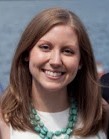
Name: Nicole Rietmann
Title: Copy Editor
Company: American Meteorological Society
Years in current position: 4.5
JL: How did you end up in this role?
NR: I’ve been interested in a career in publishing since high school. After graduating with a B.A. in English and a minor in professional writing and psychology, I attended graduate school for an M.A. in English and publishing. During grad school, I had an internship with the Chemical Heritage Foundation in Philadelphia, working on their quarterly magazine, and I found I really enjoyed working with science-based publications. My first job out of grad school was as an assistant copy editor with the American Geophysical Union (AGU). I spent three years in total at AGU (one as an assistant copy editor, two as a copy editor), and after moving to Massachusetts and working remotely for AGU for a year, I was lucky enough to land a copy editor position at the American Meteorological Society (AMS) in Boston not long after AGU announced its plans to outsource most of its publications department.
JL: What’s a typical day like for you?
NR: I work at home two days a week and commute into the office the other three. Other than the occasional meetings or events, I spend most of my day at my desk working on manuscripts and proofs. I also do some troubleshooting for LaTeX submissions, and I occasionally edit books or work on other projects.
“I enjoy being able to improve something, which I think is why I prefer editing to writing.”
JL: What do you like best about copyediting at AMS?
NR: I enjoy being able to improve something, which I think is why I prefer editing to writing. I also love knowing the work we are publishing is helping to expand scientific research and knowledge.
JL: What is one of the most challenging aspects of your job?
NR: Trying to edit for clarity and style without changing the author’s intent or the scientific meaning can be challenging, especially when there is a language barrier.
JL: What was the biggest surprise to you about this job?
NR: The biggest surprise to me is how often other people (i.e., not copy editors) assume that I absorb and fully understand everything I edit. When I tell someone I edit scientific journals, I often hear a response along the lines of, “Wow, you must learn so much reading all those articles!” It can be hard to explain that I’m not really paying attention to the science so much as I am to the grammar, spelling, and consistency of the style.
JL: What particular skills are critical to be successful in your role as a copy editor?
NR: Attention to detail is the most crucial trait for a copy editor. A love of words and grammar is also necessary, as well as an appreciation for science. Copy editors must also be comfortable spending long stretches of time sitting in front of a computer and appreciate a quiet atmosphere.
JL: What are the biggest changes you’ve seen in the industry since you started?
NR: The biggest change has been the transition to an entirely digital workflow. Papers can be submitted, edited, and published faster than ever, and access to these published papers is far greater than it ever has been.
JL: Do you have any predictions for the future of scholarly publishing?
NR: I think scholarly publishing is going the way of journalism. The need for publishers to be able to publish a growing number of papers at a constantly increasing pace means there is an overall trend within the industry of a decreased emphasis on editing and quality to meet the demands of cost and time. Many major publishers now outsource their copyediting to companies overseas or rely heavily on freelancers, and smaller publishers are partnering with these major publishers in order to stay afloat.
JL: When you were a kid, could you have imagined yourself doing this job?
NR: Definitely. I was always a bookish kid, and the idea of getting to read all day would have appealed to me greatly.
“Internships and hands-on training are more valuable than having a specialized degree.”
JL: What advice would you give to someone who’s interested in working as a copy editor or in the scholarly publishing industry?
NR: Internships and hands-on training are more valuable than having a specialized degree. My internship experience was working on a quarterly magazine about the history of chemistry, which gave me the chance to research, write, copyedit, and proofread pieces for the magazine, but it also taught me a lot about how small nonprofit organizations function and the ways in which they inform, educate, and interact with their membership and the public. Learning there was this whole publishing world beyond the big corporate publishers also really helped me when I was searching for my first job.
